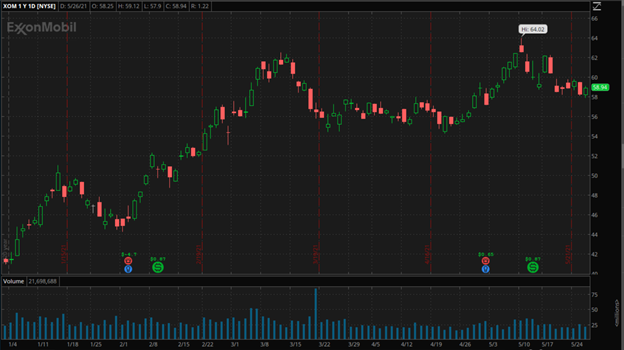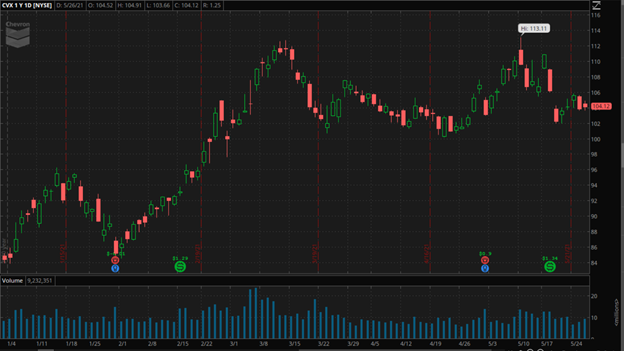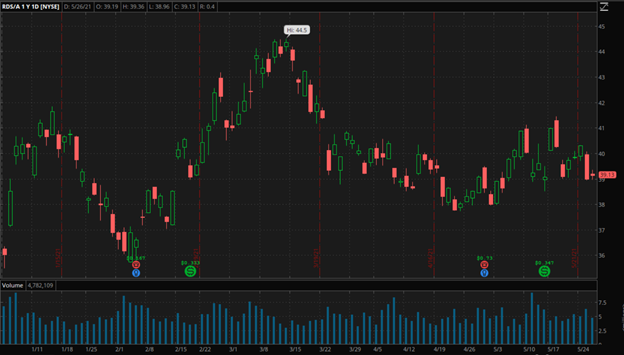What Do Climate Change Activists’ Victories this Week Mean for Energy Investors?
If you follow news and markets in the energy sector, you may well have been struck over the last couple of days by the market reaction, or rather the lack of one, to what seems like a massive story. Pressure is mounting on big oil companies to hasten their move to becoming carbon net zero in order to meet the goals of the Paris Climate Accord, and those applying that pressure achieved some notable successes recently. This was generally reported in the media as a seismic shift, and yet the shares of those companies, Exxon Mobil (XOM), Chevron (CVX), and Royal Dutch Shell (RDS/A RDS/B) barely registered the news.
XOM

CVX

RDS/A

As you can see, in all three cases the stocks have traded a little lower over the last week or so as the stories have unfolded, but really nothing outside the realm of normal volatility. Even more telling is the fact that volume in all three stocks, indicated by the blue bars at the bottom of the charts above has shown no sign of spiking. Clearly, even if some parts of the media are hyperventilating, the market is taking all this in its stride.
So, what has happened and why might there be a lot less to it than some would have you believe?
What Happened?
XOM, CVX and RDS were all forced to reduce their carbon production and environmental impact or, more accurately to do so quicker than they had planned to. The actors and the tactics used varied, but the end result was the same.
The instigator in the Exxon saga was a small activist investment firm with the somewhat cutesy name, Engine No. 1. They had proposed four candidates with a “greener” perspective for directorship in opposition to the board’s nominees, and two were elected and one was defeated, with a third race too close to call as I write. The defeat for Chevron management was less organized and didn’t involve a slate of candidates. They simply lost a vote on how aggressive the company’s emissions reduction goals should be over the next few years. Shell’s problems, on the other hand, were legal rather than shareholder driven. A court in The Netherlands found the company to be partly to blame for climate change and ordered them to cut carbon emissions by 45% of 2019 levels by 2030.
So Why No Reaction in the Stocks
These all sound like resounding victories for climate change campaigners, until you realize a couple of things. First, the Exxon Mobil board has twelve members, so even if Engine No.1 wins the third seat up for grabs, their impact will be minimal at best. Second, the call on Chevron to consider climate change is neither anything new nor really anything binding, and third, most commentators familiar with the Dutch courts predicted this outcome in the Shell case but are also predicting that the ruling will get overturned in higher courts, if for no other reason that that it is unenforceable.
So, as sensational as the news coverage of these events tries to be, they don’t actually amount to much, at least for now.
What Now?
The immediate impact of this week’s news is extremely limited, but there are some long-term implications of these moves that should be taken into consideration. By long-term here, I am talking in investing rather than trading terms…years and even decades, not hours, days, or maybe weeks.
Engine No.1 had only a 0.02% stake in XOM, so obviously couldn’t get this done on their own. What they managed to do was to convince some major shareholders to vote with them. Some of those, such as the California State Pension Fund CalPERS, are no surprise. CalPERS board members there are appointed or elected, or are career state employees and, given that California is a progressive state, their support was pretty much a given. What was surprising, though, was that one of the allies the activist fund recruited was XOM’s second biggest shareholder, Blackrock (BLK). They are a massive fund management company whose decisions are ultimately based on financial factors. their acceptance of the need for a wake up call on climate change is interesting. It means that either they are shifting to a more ESG style of investing or that they think that a climate sensitive approach going forward makes financial sense. Either way, it means we can expect a lot more of this.
The Shell situation, too, has longer-term implications.
A win in a court on the fundamental grounds that an oil company is responsible for climate change, and responsible for the consequences of the actions of their clients too, may not necessarily be fully transferrable elsewhere, but it will encourage and embolden other legal challenges. That means problems for just about every oil company, if for no other reason than that they will end up spending even more money than they do now on legal fees.
What It Means for Investors
For now, all this news means little or nothing for investors, which is why the stock market has shrugged its shoulders and moved on.
If you hold any investments in energy or trade in the sector with any regularity, you will have known for some time that, at some point, pressure from environmental activists was coming. It had to, and in that context, all the breathless reporting looks not just lame, but actually completely misleading.
Big oil has taken the first major salvo from the green lobby and emerged relatively unscathed. They will have to be a bit more proactive in their plans and preparations for a big move away from fossil fuels but, given where public opinion is and the increasing acceptance of EVs by both consumers and auto manufacturers, forcing them to confront reality is not a bad thing for any of the companies involved. The future of the stocks in the sector, then, will be more dependent more on sustaining relatively high prices for oil for a while than on boardroom and legal challenges, no matter how breathless the media coverage of the stories may be.

